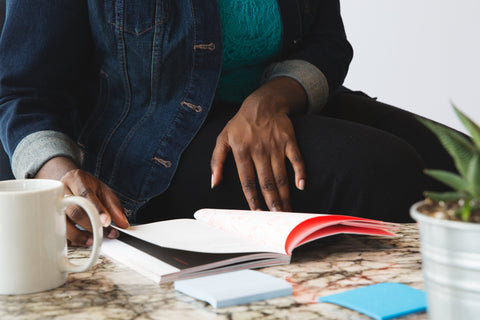People set all kinds of resolutions for the new year. Of course, after eating so much during the holidays, people naturally resolve to lose weight for the new year. Others want to spend more time living life and less time working. Though some people want to improve themselves in other ways like making mental and psychological changes.
When it comes to self-improvement, making a resolution to spend more time reading is a great way to not only learn more, but it’s also a great form of relaxation. But just picking up a book and just starting to read is probably not the best way to get started. In fact, simply forcing yourself to read more is the surest way to make sure you’ll break your resolution quickly.
For young people likely on their way to college, having an appreciation for reading is critical. College students spend a significant part of their time studying and reading in order to prepare for classes, much more than high schoolers. Developing successful reading habits is one of the most useful skills any high schooler can take with them to college.
But if it’s not as easy as picking up a book and reading, how will you develop a love of reading and create good habits? By first setting a few goals, determining what types of books you might like to read, and making a commitment to a change in your reading habits, you’ll be well on your way to creating a love of reading. Below are 10 great ways to be on your way to keeping your reading resolution.
1. Set Realistic Reading Goals
Don’t create a goal of trying to read ten books a month when you’ve never finished one a month. Ten books a month is easier for someone who already has an established reading habit and knows the books they love to read.
When you’re making goals, start one book a month and then determine how much time you will devote to reading that book until it’s done. Make a goal of devoting at least an hour daily so you don’t get bored immediately with the new task. If you find you love what you’re reading, increase your reading time by an hour, but don’t try to read the whole book overnight. You’re trying to develop a habit. This is certainly not a race.
2. Make a Reading Space Free of Distractions
In order for reading to be relaxing, you need to create a space where you will be comfortable and have few distractions. When you’re planning to sit down and read, make sure to pick a space away from things you know that will take your attention away from what you’re reading. If you’re a parent, it’s probably best to read when your kids have gone to bed. If you’re a high school or college student, the best place would be a library.
Make sure your space is somewhere you’ll be comfortable for the amount of time you’ve set for yourself to read. Choose something like a comfortable chair, your bed, or even outdoors on a comfortable night. No matter the space, make sure it’s comfortable for you and your surroundings won’t keep you from reading.
3. Find the Time to Read by Taking Time from Other Habits
Take a look at the habits you have where you could easily find the time to read. For example, if after dinner you spend the rest of your night streaming TV shows, give up an hour that’s strictly for reading a book or reading in general. If you normally spend hours at a time on your phone looking at social media, putting the phone down and reading is a great way to free yourself from a technology addiction.
People tend to make the excuse that they simply don’t have time to read a book. In reality, reading just isn’t something they find appealing so they choose not to do it. But reading requires just as little work as watching TV and best of all there are no commercials or pop-up advertisements to deal with.
4. Take Time to Relax Before You Read
Even though reading is supposed to be a stress free activity, being stressed out before you read can actually make your book less enjoyable because you will be too distracted to read.
Just before you sit down to read, make sure you take a little time to relax. Take a few deep breaths and de-stress as much as you can before you start reading. If something is seriously bothering you and you simply can’t get your mind to calm down, it’s alright. Reading is supposed to be something you enjoy and not a task that adds more stress.
5. Find the Books You Want to Read
This task can sometimes be the most difficult if you’ve never had a reading habit in your life. Thankfully, the best place to go when you’re discovering your next favorite book is the library.
This is no better resource than a librarian when you’re trying to find the books you think you might like and are trying to develop better reading habits. They know their collection forwards and backwards and can make recommendations for other books they don’t have on the shelf. The goal of a librarian isn’t to just get people to check out books from the library, but also to give all of their patrons an appreciation for reading. Helping people discover their future favorite book is part of the thrill of being a librarian.
Best of all, since you’ve found the books you want to read at the library, you can check them out for free!
6. Don’t Like What You’re reading, Stop Immediately
If after the first few chapters, the story hasn’t grabbed your interest and you’re finding it hard to enjoy the book, stop reading. Over the course of your life after you’ve developed good reading habits, you’re going to find books that sounded interesting, but ended up being not worth the read. When you come across those books, stop reading them and find something else, which leads into the next tip.
7. Always have Your Next Read Ready to Go
It’s important to keep a stack of books ready to read, even if you only intend to read a book a month. The reason being is because you don’t want there to be a gap when you’re trying to keep up a reading habit. Setting a daily reading time is important and being able to jump right into the next book after you’ve finished one will make sure you keep on reading.
Of course, having a stack of books also helps when you’ve discovered a book you don’t like and want to try something else.
8. Physical Books Aren’t Your Thing? Try an E-Reader
Even for some seasoned readers, there is something enticing about reading a story on a tablet or e-reader device. They offer the convenience of being able to hold thousands of books rather than having to carry several books around in a bag.
However, if you’re going to be using a tablet or e-reader in bed, make sure the device has a setting for night mode. Blue light from our devices such as cell phones, tablets, and televisions can contribute to poor sleep.
9. Join a Book Club
After you have a few books under your belt and you’ve been consistently hitting your reading goals, consider joining a book club. Book clubs give people who enjoy an opportunity reading the chance to share their favorites with others as well as read the same book at the same time and give each reader the chance to give their opinions about the book.
10. Make a List of Future Reads
You don’t need to buy or check out everything you want to read right away. When you hear about a book you think sounds interesting, place it on a list of future reads. The website Goodreads.com allows users to sign and not only show friends and family what they’re reading, but also create lists for things they want to read or books they’ve read previously.
Here’s a bonus tip: Take advantage of your local library. There’s no reason to buy books if you’re close to a library where you can check out books for a few weeks at a time. Your library may even have an e-book collection which you can access on your tablet, e-reader, or phone by simply using your library card.
Audio books are also a great option if you’ve discovered you find it hard to concentrate with a physical book. The point isn’t to pick up physical books, but to appreciate absorbing more knowledge and stories by way of novels, even if you prefer them read to you.




Comments (0)
There are no comments for this article. Be the first one to leave a message!